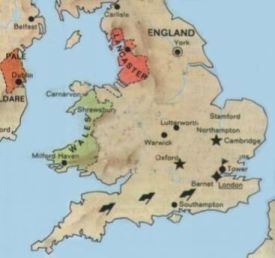![[image of John Wyclif]](/images/wiclif.jpg) |
| John Wyclif |
Because of the hundred years war most of the lords were occupied robbing Frances treasures (the victory of Crecy in Northern France literally changed the whole life in England). But then the war turned in favor of the french army and in 1374 a truce was concluded and the english lords had to satisfy their needs by increasing the pressure on their own population, the workers and peasants in England. By doing so they aggravated a situation of discontent. The Black Death had ravaged England in 1348/49 and nearly half of the population had died with the consequence that working people were rare and wages high. The Government issued laws aiming to reduce wages at their level before the plague and the lords, unsuccessful in the war, applied their privileges strictly. Especially the crown was in need of money to continue the war against France. The unpopular levy of 1377, a proportionate poll tax on every adult, was followed by the graduated tax on moveable property of 1379, the latter a failure that resulted in the replacement of the Chancellor, Richard Scrope. In 1380, Parliament allowed the king, through his new Chancellor, Simon Sudbury, Archbishop of Canterbury, to assess a flat tax of three groats (one shilling) on every man and woman over the age of fifteen. This was more as the lower classes could pay, but tax collectors enforced the application, often diverting the result to their personal fortune: "The kyng therof had smalle." The rallying-point for the rebellion was the poll tax of 1380-81, a tax that, as an anonymous poet said, "has tenet us alle." This was the third poll tax, and it was enforced by commissions of inquiry, which investigated whether all persons were complying with the tax.
The situation of the peasants became insupportable and the english peasants uprising began. It had been prepared and guided mainly by the preachers John Ball and Jack Straw, whereas the peasants in Kent were led by Wat Tyler.
John Ball saint mary priest, greteth well all maner of men, and
biddeth them in the name of the trinitie father, son, and holy ghost, stand
manlike together in truth, and helpes truth, and truth shal helpe you:
Now reigneth pride in price,
couetise is holde wyse,
lechery without shame,
glotony without blame:
envy reigneth with treason,
and slouth is taken in great season.
God doe boote, for nowe is time!
Amen.
(John Ball's Letter)
The riots started the same day all over the country. At those times there wasn't any telephone and you couldn't write a letter, most peasants could not read nor write. But there were beggars and travelling preachers, who relayed news important to poor people. These beggars were mostly unemployed workers from Norfolk, England's main center of textile industry.
 On June 10, everywhere peasants united
and marched towards London. On their road they liberated John Ball from
prison. Ball had been arrested shortly before by order of the bishop of
Canterbury. Arriving near London at Blackheath, the peasants wanted to see
the king for accepting their griefs.
On June 10, everywhere peasants united
and marched towards London. On their road they liberated John Ball from
prison. Ball had been arrested shortly before by order of the bishop of
Canterbury. Arriving near London at Blackheath, the peasants wanted to see
the king for accepting their griefs.
Meanwhile, On June 11, the insurrection of the workers in Norwich had started. Their leader was Geoffrey Litster. But the workers were no soldiers (many of the peasants had served during the war in France) and their enemy, bishop Henry Despencer defeated them in a bloody battle. Many of the workers were killed by the bishop and his troops. after the battle, Spencer himself gave the absolution to the survivors - just before their execution.
Let's return to London, where nearly 100.000 peasants attended the king. King Richard, a 15 year old boy, came on a barque on the river Thames. When he saw the impressing camp of the angry peasants, he didn't even leave his boat, he returned straight to London Tower. This made the peasants more angry, and the next day, June 12, they entered into London town.
On June 14, the Tower was taken and the Sudbury, Archbishop of Canterbury was killed as well as the treasurer, Hales, but king Richard II escaped. Now the king accepted negotiations with the peasants at Smithfield. Many of the peasants, seeing that the king was finally accepting their conditions, went home. But sufficient of them remained with John Ball and Jack Straw. The king asked Wat Tyler to come to him and set up the details of the treaty. Suddenly, one of the Lords (Walworth or Standish) approached from behind with a sword and killed Wat Tyler. This was the signal for kings troops (8000 men) to attack the peasants. 1500 of them were killed that day. At the same time 151 rebels were killed in London by order of Lord Mayor Walworth, among them Jack Straw. John Ball was captured a month later, brought to St. Albans and sentenced to a cruel death.
Etienne Marcel |